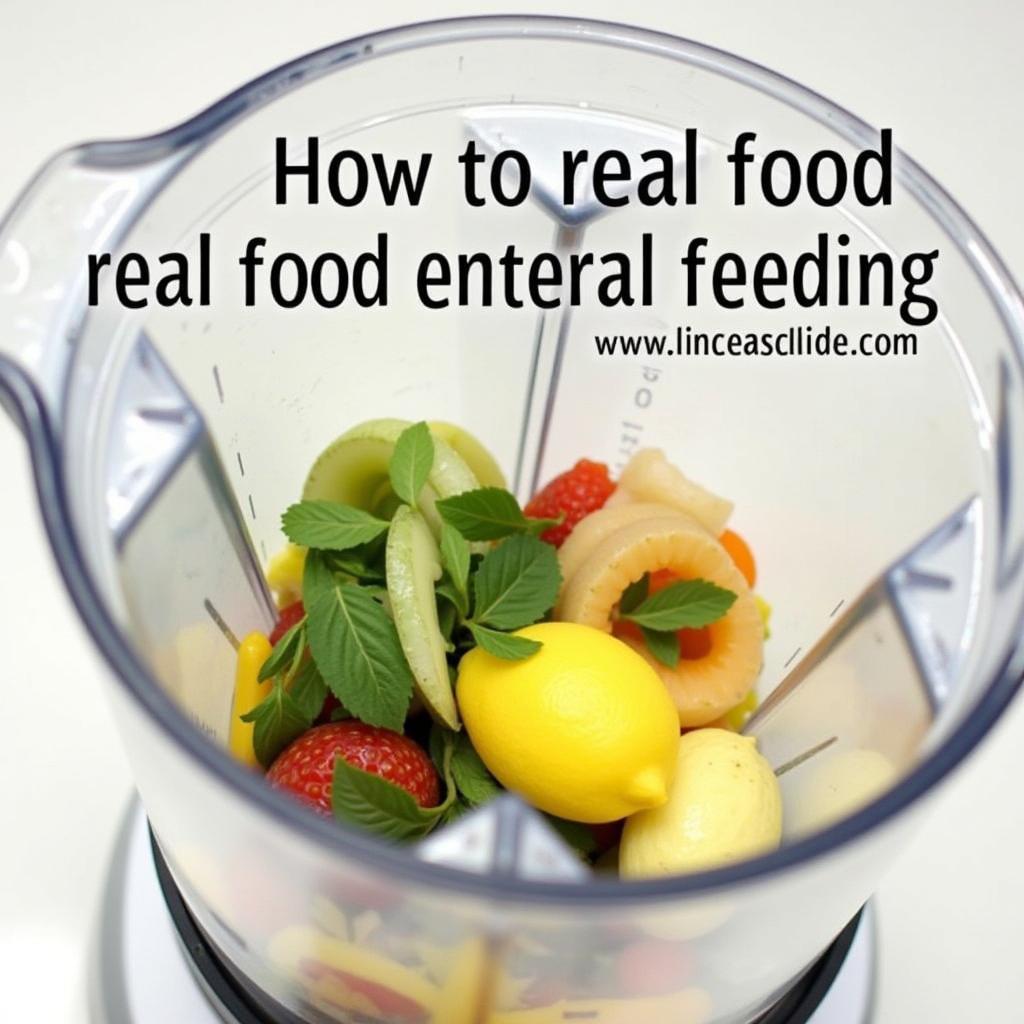Real Food Enteral Feeding offers a personalized and potentially beneficial alternative to standard formulas. It involves using whole foods, blended into a liquid form, to provide nutrition directly to the digestive system. This approach prioritizes nutrient-rich, easily digestible ingredients to support healing and overall well-being.
Understanding Real Food Enteral Feeding
Real food enteral feeding is gaining traction among those seeking a more natural approach to nutritional support. Unlike commercially produced formulas, which often contain processed ingredients and additives, real food blends focus on whole, unprocessed foods like fruits, vegetables, lean proteins, and healthy fats. This method allows for customization based on individual dietary needs and preferences, offering a potentially more palatable and digestible option for those requiring enteral nutrition. What makes real food enteral feeding stand out is its emphasis on maximizing nutrient density and minimizing artificial ingredients.
Benefits of Real Food Enteral Feeding
The benefits of real food enteral feeding extend beyond just providing essential nutrients. Many advocates believe it can contribute to improved gut health due to the presence of natural fibers and prebiotics found in whole foods. This can lead to better nutrient absorption and reduced digestive discomfort. Additionally, the personalized nature of real food blends allows for addressing specific dietary restrictions or allergies. It also empowers individuals to have more control over their nutritional intake, fostering a sense of autonomy and connection to their food, even when relying on a feeding tube.
Improved Gut Health and Nutrient Absorption
One of the key advantages of real food enteral feeding is its potential to promote a healthy gut microbiome. The diverse range of nutrients and fibers in whole foods provides nourishment for beneficial gut bacteria, contributing to a balanced and thriving gut environment. This, in turn, can lead to enhanced nutrient absorption, ensuring the body receives the maximum benefit from the food.
 Real Food Enteral Feeding Blending Process
Real Food Enteral Feeding Blending Process
Addressing Dietary Needs and Allergies
Real food enteral feeding provides a flexible solution for individuals with specific dietary needs or allergies. Whether it’s gluten intolerance, lactose sensitivity, or a nut allergy, customizing the blends allows for eliminating problematic ingredients while ensuring adequate nutrition. This level of personalization can significantly improve tolerance and minimize adverse reactions.
Implementing Real Food Enteral Feeding
While real food enteral feeding offers several potential benefits, it’s crucial to consult with a registered dietitian or healthcare professional before making any changes to a feeding regimen. They can provide guidance on appropriate recipes, food safety practices, and ensuring nutritional adequacy. Proper hygiene and food handling are paramount to minimize the risk of contamination and ensure the safety of the blends.
Consulting with a Registered Dietitian
A registered dietitian plays a vital role in implementing real food enteral feeding safely and effectively. They can assess individual nutritional needs, create personalized recipes, and monitor progress. They can also educate individuals on safe food handling practices and potential challenges.
 Real Food Enteral Feeding Consultation with Dietitian
Real Food Enteral Feeding Consultation with Dietitian
Conclusion
Real food enteral feeding presents a promising alternative to traditional enteral nutrition, emphasizing whole foods and personalized blends. While further research is needed to fully understand its long-term effects, the potential benefits for gut health, nutrient absorption, and addressing dietary needs make it a valuable approach to explore with the guidance of a healthcare professional. By prioritizing real food ingredients, individuals can take an active role in their nutritional well-being and experience the nourishing power of whole foods.
FAQ
- Is real food enteral feeding suitable for everyone?
- What are the potential risks of real food enteral feeding?
- How do I ensure food safety when preparing real food blends?
- Where can I find reliable recipes for real food enteral feeding?
- Can real food enteral feeding be used for long-term nutritional support?
- How often should I consult with a dietitian when using real food enteral feeding?
- Is real food enteral feeding more expensive than commercial formulas?
Need support? Contact us at Phone Number: 02437655121, Email: [email protected], or visit our address: 3PGH+8R9, ĐT70A, thôn Trung, Bắc Từ Liêm, Hà Nội, Việt Nam. We have a 24/7 customer service team.